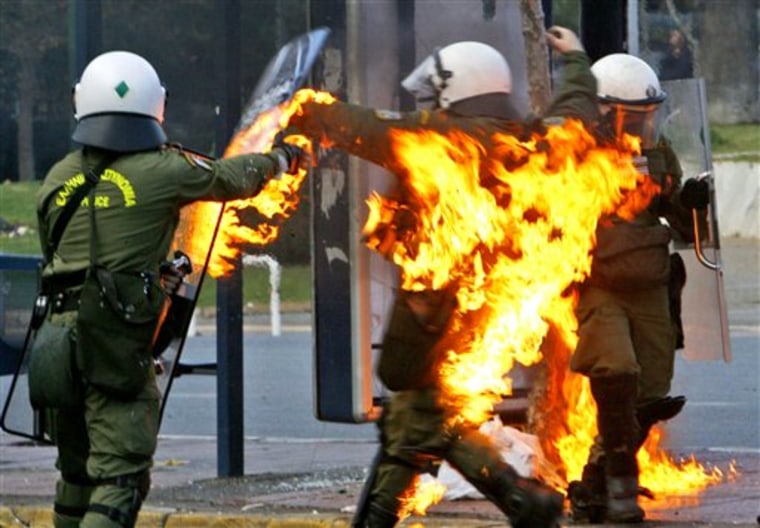Youths hurled rocks and Molotov cocktails and heavily armed Athens police responded with stun grenades and tear gas Friday, as deep discontent with the government and the global economic meltdown erupted on the Greece's seventh straight day of riots.
The prime minister rejected calls to resign and hold early elections, insisting that a steady hand was needed in times of financial crisis.
"There should be no confusion between the emotions felt by young students over the tragic death of a colleague ... and this destructive mania," Prime Minister Costas Karamanlis said Friday.
The riots broke out Saturday within hours of the police shooting death of 15-year-old Alexandros Grigoropoulos, and have since expanded to encompass general anger over economic hardship. Hundreds of stores and dozens of cars have been destroyed or damaged in cities across the country.
"What started as an outburst of rage over Alexandros' killing is now becoming a more organized form of protest," said Petros Constantinou of the Socialist Workers Party.
Government under pressure
Workers in banks along Athens' central Syntagma Square watched in fear Friday as protesters shattered windows just replaced days ago.
Protesters also smashed their way into the main branch of the National Bank of Greece, sending employees fleeing in panic. One protester walked up to the Tomb of the Unknown Soldier outside Parliament and threw a black-and-red anarchist flag at it. Petrol bombs left one policeman covered in flames.
Protesters briefly occupied a private Athens radio station and read a statement on the air and took over a municipal building in the northwestern city of Ioannina.
The worst riots Greece has experienced in decades has hammered Karamanlis' conservative government, which already faced vociferous opposition to economic and social reforms. Karamanlis, whose party has only a single seat majority in parliament, rejected calls for him to resign, saying Friday that Greece needed to focus instead on the global financial crisis.
"That is my concern and the concern and the priority of the government, and not scenarios about elections and successions," Karamanlis said in Brussels, Belgium, where he was attending an European Union leaders meeting on climate change.
Protesters who are occupying high schools and universities are demanding a reversal of public spending cuts, the resignation of the country's interior minister and the release of arrested riot suspects.
About 200 people have been arrested during the riots and dozens of people injured.
As unrest spilled over into other European cities, concerns have been raised that the clashes could be a trigger for globalization opponents, disaffected youth and others outraged by the continent's economic turmoil and soaring unemployment.
"Financial targets are being attacked — like banks — to prove a point of economic oppression ... some people hardly have enough eat," said Constantinos Sakkas, a 23-year-old protest organizer.
"We're against the attacks on small stores," he added. "The purpose of all this is for our demands to be heard. This just isn't for us. It's for everyone."
The protests are driven in part by the widening gap between rich and poor in a country where the minimum monthly wage is 658 euros ($850), graduates have poor job prospects and the government is making painful reforms to the pension system.
"It is clear that this wave of discontent will not die down. This rage is spreading because the underlying causes remain," said veteran left-wing politician Leonidas Kyrkos. "These protests are a vehicle with which people can claim their rights and shatter indifference and false promises."
Unrest spreads
In Paris, about 300 demonstrators gathered Friday outside the Greek Embassy. Some scuffled with police and spilled over onto the Champs-Elysees, partly blocking Paris' most famous avenue, some ripping out streetlights from the center of the road as they moved along.
"Police, pigs, everywhere!" they shouted, bemused bystanders in red Santa hats watching as police vans with and riot officers in helmets and shields marched down the avenue in their wake.
Outside the embassy, demonstrators shouted "Murderous Greek state!" and "A police officer, a bullet, that is social justice!"
Hundreds of protesters also marched through Berlin's Kreuzberg neighborhood, behind a van broadcasting messages of solidarity with the Greek protesters.
Earlier in the week, protesters in Spain, Denmark and Italy smashed shop windows, pelted police with bottles and attacked banks, while in France, cars were set ablaze outside the Greek consulate in Bordeaux, where protesters scrawled graffiti warning about a looming "insurrection."
The two Greek police officers involved in the shooting that triggered the unrest have been jailed pending trial, one for murder and the other as an accomplice. They say they were attacked by a group of youths and that one officer had fired warning shots, but witnesses have disputed the claim.
Their defense lawyer, Alexis Cougias, said ballistics testing of the bullet that killed Grigoropoulos showed it had ricocheted. The ballistics report has not been released.
Greek police will review their firearms policy, Panayiotis Chinofotis, the deputy minister for Public Order, assured parliament on Friday.
Protestors are planning daily marches in the capital next week.
More on European Union | Costas Karamanlis
